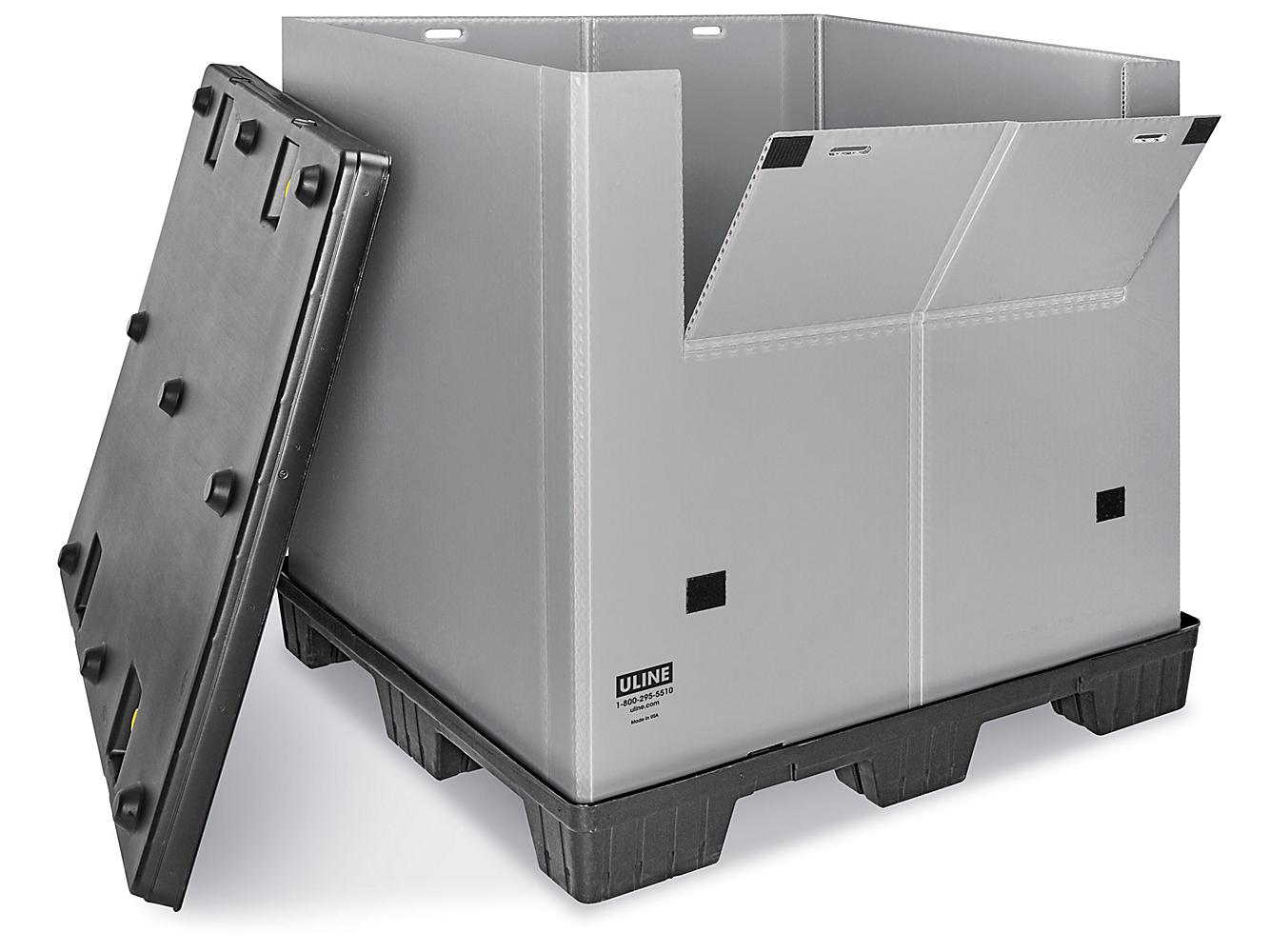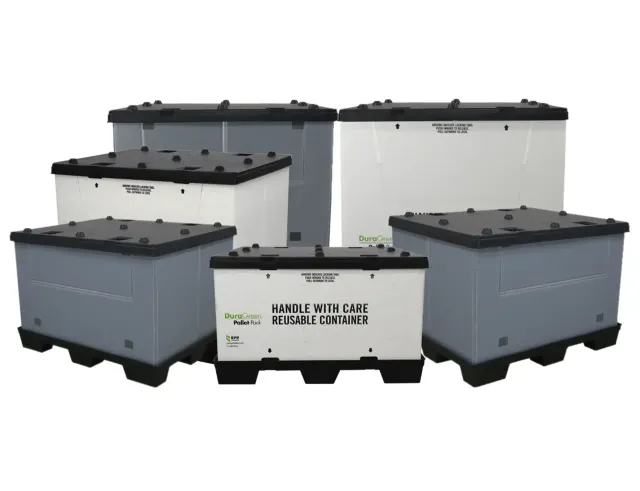The Role of Mass Plastic Containers in Effective Recycling Practices and Sustainability
Bulk plastic containers are important to modern-day reusing initiatives. Their design improves the effectiveness of material collection and transport, adding to sustainability objectives. These containers not just enhance space but additionally assist in keeping an eye on contamination degrees. Their application is not without obstacles. Comprehending the full scope of their effect reveals a complicated relationship between logistics and environmental responsibility that requires further expedition.
Recognizing Bulk Plastic Containers
Bulk plastic containers function as a crucial part in numerous sectors, assisting in the storage and transportation of items. These containers are typically made from robust materials such as high-density polyethylene (HDPE) or polypropylene, which provide sturdiness and resistance to environmental aspects. Their design frequently consists of attributes like stackability and modularity, enabling effective use area during both storage and transportation.
Industries such as farming, food processing, and manufacturing regularly utilize bulk plastic containers due to their lightweight nature and ease of handling. The containers are available in various sizes and arrangements, providing to the certain requirements of various items. Their versatility extends past plain capability; they can likewise be customized with covers, deals with, and classifying choices to enhance functionality - bulk plastic containers for sale. As a result, bulk plastic containers play a crucial role in enhancing logistics and supply chain operations across numerous fields, consequently adding to total performance and cost-effectiveness
Advantages of Utilizing Mass Plastic Containers in Recycling
The application of mass plastic containers greatly boosts the efficiency of the procedure when organizations focus on reusing efforts. These containers are created to maximize space, permitting the storage and transport of bigger amounts of recyclable materials. This leads to fewer journeys to recycling centers, thereby decreasing gas usage and associated exhausts.
Furthermore, bulk plastic containers are resilient and immune to different environmental aspects, ensuring that materials remain protected throughout handling and transportation. Their lightweight style additionally adds to decrease transportation costs.
Moreover, the uniformity of these containers assists in better sorting and processing of recyclable materials, which can enhance general recycling prices - plastic bulk containers. Organizations that embrace bulk plastic containers additionally show a commitment to sustainability, positively influencing their brand picture. Ultimately, these advantages not just streamline reusing practices however also add to more comprehensive ecological goals
Exactly How Mass Plastic Containers Facilitate Material Collection
Efficient product collection is substantially enhanced by the use of bulk plastic containers, as they provide a reliable and structured solution for gathering recyclable items. These containers are created to suit large quantities of products, which streamlines the sorting and storage procedure. Their stackable layout maximizes room usage, making it much easier for centers to arrange recyclables without mess.
In addition, mass plastic containers are durable and weather-resistant, permitting for exterior positioning without degradation. This strength assures that materials stay secured until they are gathered for handling.

The uniformity in dimension and form of these containers helps with standardization across collection points, making it possible for much better monitoring of recyclable quantities. Their transparent nature enables for very easy exposure of contents, aiding in the monitoring of contamination degrees and ensuring that just suitable materials are collected. On the whole, bulk plastic containers play a critical function in enhancing the material collection process, consequently advertising efficient recycling methods.
Transport Effectiveness and Environmental Impact
Transportation performance plays an important function in the recycling procedure, especially through the optimization of load capacity in mass plastic containers. By optimizing the quantity of product moved, companies can considerably lower the number of trips required, thereby minimizing their carbon impact. This technique not only enhances operational performance yet likewise adds to a lot more lasting ecological methods.

Optimizing Tons Capability
Although optimizing tons ability is commonly forgotten, it plays a vital function in boosting transportation efficiency and lessening ecological impact in recycling methods. By making the most of the quantity that bulk plastic containers can hold, recycling operations can minimize the number of journeys needed for transport. This not only lowers fuel usage however additionally decreases the wear and tear on cars. Reliable load monitoring enables facilities to use space efficiently, guaranteeing that each transportation cycle is as productive as feasible. Furthermore, her comment is here well-optimized loads can lead to much better settlements with logistics service providers, possibly reducing overall expenses. Eventually, enhancing load ability contributes to a more sustainable recycling system by cultivating reliable source usage and reducing waste generated throughout transportation.
Decreasing Carbon Impact
As reusing operations endeavor to lessen their ecological effect, minimizing the carbon footprint related to transport emerges as an important goal. Mass plastic containers play a critical duty in accomplishing this objective by boosting tons effectiveness and maximizing logistics. Their light-weight yet long lasting style permits optimum cargo space utilization, lowering the number of journeys needed to carry materials. By combining deliveries, reusing facilities can lower gas consumption and greenhouse gas emissions. In enhancement, purposefully situating recycling facilities lessens transport distances, additionally reducing carbon results. In addition, using fuel-efficient automobiles and alternate power resources enhances total sustainability. By incorporating these techniques, the recycling market can appreciably lessen its carbon impact, adding to a more lasting future.
Difficulties in the Usage of Mass Plastic Containers

Contamination Concerns
Contamination issues stand for a significant challenge in the reliable use bulk plastic containers within reusing methods. These containers commonly collect deposits from previous materials, resulting in mixed products that can hinder the recycling procedure. Impurities such as food waste, chemicals, or non-recyclable materials can endanger the stability of the whole set, leading to raised disposal prices and decreased reusing prices. Furthermore, inappropriate cleaning or sorting can intensify these concerns, making it challenging for reusing centers to refine products effectively. The presence of contaminants not only affects the high quality of recycled products but likewise undermines the total sustainability efforts targeted at reducing plastic waste. Attending to these contamination obstacles is essential for improving the effectiveness of bulk plastic container recycling.
Recycling Facilities Limitations
Inadequacy in reusing infrastructure poses considerable obstacles for the efficient monitoring of bulk plastic containers. Several recycling facilities lack the capability to refine huge volumes of these containers efficiently, causing raised expenses and hold-ups. Poor arranging modern technologies commonly lead to contamination, as mass containers may be mixed with other products, complicating the recycling procedure. Limited transportation alternatives additionally impede the activity of bulk plastic containers to appropriate recycling facilities, causing increased landfill waste. In addition, an absence of standardized procedures for mass container recycling produces confusion among consumers and companies, even more making complex initiatives to promote sustainability. Dealing with these Get the facts infrastructure constraints is important to boost reusing methods and maximize the potential of mass plastic containers in a round economic situation.
Finest Practices for Implementing Mass Plastic Containers
They should focus on a critical technique that improves effectiveness and decreases contamination threats when companies take into consideration carrying out mass plastic containers in their reusing techniques. First, picking the appropriate why not find out more container size and type is vital to suit the quantity of products being processed. Organizations should also establish clear labeling and signage to lead users on proper disposal methods, decreasing confusion and mistakes. Routine training sessions for team can additionally enhance these methods, guaranteeing everyone recognizes their roles in keeping reusing stability.
Furthermore, companies must execute a regular upkeep routine to examine and clean containers, avoiding the accumulation of impurities. Partnering with regional recycling facilities can also streamline the collection procedure, ensuring that products are properly processed. Companies should keep an eye on and review their reusing metrics, using this data to refine methods over time and advertise constant renovation in their sustainability efforts.
The Future of Mass Plastic Containers in Sustainable Practices
As companies increasingly focus on sustainability, the role of mass plastic containers in recycling methods is established to evolve substantially. Advancements in products scientific research are causing the advancement of eco-friendly and recyclable options, enhancing the environmental advantages of bulk plastic containers. On top of that, the execution of closed-loop systems will certainly enable much easier collection and repurposing of these containers, lowering waste and resource intake.
Technical innovations, such as wise radar, will enable firms to check the lifecycle of mass containers, boosting performance in recycling processes. As customer need for sustainable techniques expands, businesses will likely adopt bulk plastic containers designed for reuse and long-term worth. Cooperation between federal governments and markets will cultivate the facility of standardized reusing protocols, ensuring that mass containers are successfully incorporated into wider sustainability efforts. On the whole, the future of mass plastic containers shows up promising, with substantial possibility for adding to a circular economic situation.
Often Asked Inquiries
Just How Are Mass Plastic Containers Made and What Products Are Used?
Bulk plastic containers are usually made from high-density polyethylene (HDPE) or polypropylene (PP) These materials are processed with injection molding or blow molding methods, causing resilient, lightweight containers ideal for different storage space and transport needs.
Can Bulk Plastic Containers Be Recycled Multiple Times Prior To Recycling?
Yes, bulk plastic containers can be recycled numerous times prior to reusing. Their longevity and design enable for repeated use in different applications, promoting sustainability and resource effectiveness while lowering the need for new containers.

What Qualifications Exist for Bulk Plastic Containers in Recycling?
Various accreditations for bulk plastic containers consist of the Recycling Partnership's accreditation, the Cradle to Cradle Certified ™ standard, and the Lasting Product packaging Union's standards, making certain containers meet particular ecological and recyclability standards for reliable recycling.
Just How Do Mass Plastic Containers Contrast to Various Other Recycling Storage Space Options?
Mass plastic containers offer greater durability and capacity contrasted to other recycling storage space options, lowering the danger of contamination and facilitating reliable transportation. Their design sustains far better company, boosting overall effectiveness in recycling operations.
What Is the Lifespan of a Mass Plastic Container in Recycling Processes?
The life expectancy of a mass plastic container in reusing processes commonly ranges from 5 to 10 years, depending on usage, material high quality, and environmental problems, enabling several cycles of usage before eventual disposal or recycling.
When companies prioritize recycling efforts, the utilization of bulk plastic containers greatly enhances the efficiency of the procedure. Transportation efficiency plays a crucial role in the recycling procedure, specifically through the optimization of tons capability in mass plastic containers. The usage of mass plastic containers in reusing practices deals with substantial difficulties, particularly worrying contamination concerns and constraints within reusing facilities. Contamination concerns represent a significant difficulty in the effective usage of bulk plastic containers within reusing practices. When companies think about applying mass plastic containers in their reusing practices, they ought to prioritize a critical strategy that boosts performance and reduces contamination risks.